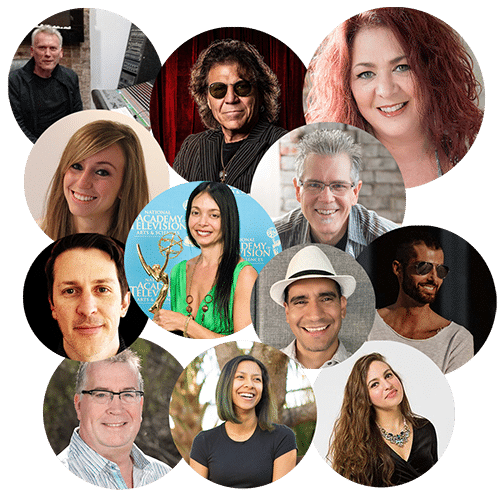Overcoming the fear of failure is a topic we’re all familiar with these days, but have you ever analyzed how much the shadow of failure drives your career and choices?
This topic is particularly important to me because I realized how much the misconception and fear of failure (which wears many masks) had driven my decisions and artistic attitude for several years. I studied it and its different forms and still today, I always try to identify whenever I’m doing (or not) something because of fear.
First of all: the above sentence already tells something more than meets the eye. When we are afraid of something, that something is almost never there. It’s rather the reflection of it that appears before us, therefore we project backward the effects of such things on the present moment. The allegory of the cave by Plato explained it much better than I could do.
Overcoming the fear of failure starts by observing the shadow of failure, bringing it to the present, and understanding that the future will never be different than the shadow itself. It’s like denying the sun exists because you’ve never left the cave. So, whenever we are talking about failure, most of the time we are way behind failure itself: we’re simply stuck from this side of the ocean.
For some funny reasons, very few of us develop a mentality that, since the beginning, lets us quite peacefully coexist with the concept that “a destination is something that’s reached by putting one step at a time”. In a world of Benjamin Buttons, we’d all be born with achievements in our hands and then we’d gradually be moving backward observing how many crazy things happened (almost never according to plan) before we got there. We’d observe a path that isn’t linear, free from deflections (we might call it a failure in the moment), smooth, and friendly all the time.
So, the first big issue (and I mean it, it’s huge) is: do you accept that things are created because they don’t exist yet? Do you accept that the process of creation implies many blind spots, misconceptions, and findings that are completely different than expected?
I’m not being ironic: the concept I just expressed is tremendously hard to process, accept, and then bring to action. That is why many lives are lived rejecting it, walking as far as possible from it thus, molded by fear. For a long time, I used to blame those who couldn’t face their fears and go get what they said they wanted. But, doing this successfully is kinda like climbing K2. I would never disrespect someone who doesn’t want to climb the hardest mountain and has no intention to train himself for doing it. Again, I mean it. There’s no irony in my words.
However, since I believe we can always try to improve a bit, I’ll go on talking about what I learned by studying and observing our fears, which are the real deal when it comes to making (or preventing) things from happening. The most interesting insights came from realizing that most of the time, fear does not manifest as the typical “I’m scared of spiders” thing. It’s rooted and embedded in our bones, hardwired into our brain, and goes neck to neck with our motherboard, which is programmed since the first instants of our life and will always try to act accordingly for the rest of it. It’s both composed of dreads that have a direct origin (e.g. something that has happened to us) and some that don’t even belong to us but to our inner circle, above all parents. Some may even come from past lives if you believe such things (which I do).
“Courage is not the absence of fear, but rather the judgment that something else is more important than fear,” wrote Ambrose Hollingworth Redmoon. That is: the goal isn’t to eradicate it or, as I often read and couldn’t agree less, become “fearless”. A baby, who is yet to develop the part of the brain that lets him recognize where danger is, might run towards the stairs, put his hand on fire, drink engine oil, etc. You would never be calling that brave; if an adult did that, you’d pretty much conclude it’s a stupid unnecessary risk, right?
Hence the point is not acting free from fear but rather in spite of it. To do so, we must first admit it exists, give her a name, make friends with and then try to find the best way to sneak around it and, if possible, even learn from it.
Why am I speaking so intensively about fear as an artist? Because choosing to dedicate your life or a big part of it to something so intangible like art and music carries a load of dread. I look back and I remember how much time I had spent wrapped into a straitjacket, preventing me from walking towards what I loved most, to the point that I even tried to “poison” art and music, in order to justify why I should have distanced myself.
For this reason, I feel like sharing some of my personal insights and things I learned by analyzing my and my students’ fears throughout more than a decade. Let’s get started.
DISCLAIMER: The following list is no scientific essay; it only aims to share personal experiences and common patterns that I observed and researched over 15+ years. These 8 patterns aren’t the only ones I observed but they surely felt the most frequent and powerful.
1. Your parents and childhood inner circle shape you early in life.
In the first 7-8 years of our life, we learn pretty much everything that will shape how we think, feel, behave, react, etc.
It goes without saying that our family and inner social circle play the biggest role in determining our future actions. I’ve traveled a lot throughout 4 continents (yep, I haven’t made it to Australia yet) for many years, and the majority of the people and cultures I met share a common belief: art and music are good for having fun, escaping reality, connect with the intangible, transcend a bit, making rituals, etc.
When it comes to turning into a profession, parents don’t seem to be so enthusiastic about considering it as an option for their beloved children. I found and connected a lot of reasons for this and they date back centuries. Going into details now would be too long so I’ll just say: you’re not alone, when your parents, closest friends, and family don’t support you. Welcome to the club, buddy.
Don’t struggle with it: accept it. Don’t blame (too much) your parents, but understand that you weren’t born to live the life they thought was the right one for you. Becoming the adult YOU want to be is your job, nobody else’s.
2. We’re trained to settle, not to succeed.
Succeeding means making things happen. Since humanity mostly lives in survival mode, it makes sense that even in the Western world, where the economy works a little better, we grow up with the mentality that “a roof above the head, a good paying job, a partner and a couple of kids” are the best and ultimate goal we all should aspire to.
There’s absolutely nothing wrong if your aspirations and your happiness genuinely coincide with that concept. But it’s not something you can decide previously. And “if you never try you’ll never know,” says a very famous Coldplay song.
3. If control represents peace and stability, the lack of it generates anxiety and frustration.
Many of the assumptions we falsely base our (idea of) happiness on are implying to be in control (predict) of your life.
Embracing an artistic life (and more in general, any personal project) means getting rid of this harmful need of predicting what’s happening tomorrow.
The truth is that we don’t know and we can’t control it. All we can do is address the present in order to lead each single step towards the desired direction. Giving up the craving for knowing how my tomorrow is going to be helped me tremendously, and not only in art.
It calmed my mind, humbled my soul, and let me gather much more energy and strength, once chained by fear.
4. Setbacks aren’t failures.
For certain and quite understandable reasons, we all grow up misunderstanding setbacks for absolute failures.
We happen to conceive that achieving a goal is walking smoothly on a straight line that goes from A to B with nothing in between. In the digital era, whereas speed seems to be a value for itself, what’s not obtained fast and without sweat might be taken too quickly as a final failure.
Remember when GPSs weren’t around? You wanted to reach a point for meeting with somebody. Do you really mean to tell me that all the time you got lost, you headed back home because you couldn’t find the way?
Even today, what does a GPS do as we’re taking the wrong way? It recalculates.
Meaning: find an alternative. Of course, you MUST know that you wanna be there.
If that intention isn’t very solid, well, it gets harder to justify setbacks and not giving up.
“If it is important to you, you will find a way. If not, you’ll find an excuse”. – Ryan Blair
5. We have a fear of fear.
This is my favorite. By reading the amazing book “Atlas of the Heart” by Brené Brown I learned that we always “double” our feelings.
We’re sad about our sadness, we’re happy that we’re happy and, of course, we’re scared to be scared.
Since we don’t conceive fear (neither its utility nor its damages) when we’re naturally scared of something, the fear of being scared is triggered too.
Feelings aren’t rational. Most of the time they’re not even based on facts. They are what they are but they mainly rely on our perception of reality and how we react to our projection of things.
I ironically say it is my favorite because, in my opinion, this can be one of the most harmful. It is ok to be scared: we’re humans. It is less ok to get stuck (and remain so) because what you fear, is fear itself. Overcoming the fear of failure doesn’t mean you won’t be scared.
“If your dreams do not scare you, they are not big enough” – Ellen Johnson Sirleaf
6. We have a loyalty to our clan.
This could have gone next to the first point: family and inner circle.
Humans are social beings. Our family and our closest relationships represent a connection that’s much deeper than gratitude for changing our diapers or feeding us for a few years.
Present and past lives entail legacies, pacts, and patterns we call loyalty. In other words, after the very difficult part of accepting that those who love us are not necessarily meant to understand us, we need to handle the awful sensation of letting a beloved one down, breaking the pattern, and cutting the loyalty thread.
Both in psychology and in spirituality, this is a very serious issue because it works at a very deep level in our subconscious: if not spotted and handled (professional help is the best way), it can very easily drive our entire life, without us even knowing it.
7. We see “NO” as normal and “YES” as a breakthrough.
This is great to figure out, but works fantastically in music and art. If you wanna be serious about your career, let’s face it: every industry and business is made of levels, hierarchy, and people controlling certain gateways.
Being told “NO” to your current state and/or project can be extremely frustrating, but too often it’s taken as a tragedy or as final.
You can google how many international stars have been told several times “you aren’t good enough / you don’t have it / you shall never make it” or even worse.
No is perceived as NORMAL.
The very crucial part, besides not falling apart every time someone says he or she doesn’t like your project, is always know what the takeaway is (if any) from that rejection.
Stars aren’t born in a day so you cannot really expect that your project reaches its best shape in a short time. You have to keep working and improving what you have.
I personally assure you that when what you have is good enough, you’ll know it. Both because you’ll feel it different, and because even the NOs will sound different.
8. Last (but not least) is the Fear of Competition
Competing means inherently comparing: and no one likes being compared (especially if the person you are comparing yourself to is or feels in a better stage of his/her career and life).
The social media era made this comparison even heavier and 24/7, and there’s no way to escape it.
My humble advice? Reduce the time spent on social media and redirect that time to the improvement of your skills.
If liking someone’s music is subjective, quality is not.
You will know when you’re good at singing, songwriting, producing, mixing, or whatever you’re pursuing. And it’s only then that your gut feelings and the people you compare yourself to won’t be a burden anymore.
But in order to naturally get to that without imploding first, you have to protect yourself from wrong and unnecessary comparisons.
You cannot compare yourself to someone who has been doing music for 20+ years if you are in your artistic infantry.
In all cases, these should serve as examples and inspiration, not comparisons. For the same reason I can’t compare apples with bananas, you have to know what fruit basket you’re in and protect your progress.
WORDS OF ADVICE FROM MY HEART TO YOURS:
At the end of this post, the most important thing: recognizing yourself in one, more, or even other patterns IS FINE AND NORMAL.
A life spent on art and music is undoubtedly difficult, no question about that. Whoever says it is easy (or wants to make it appear) is either scamming you for personal benefit or doesn’t know what he/she’s talking about. The higher your goal is, the more you’ll have to improve, train yourself and deploy discipline in order to become the person that can endure what others can’t.
Overcoming the fear of failure is required to pursue art, music, and anything outside of what’s considered normal.
Don’t be afraid of failure: be afraid of failing your heart and soul.
– Jake

Stop Feeling Isolated & Let’s Build Your Music Career Together
Are you a serious career musician looking for help from real industry humans?
Are you fed up with the lack of help from the many online music cliques?
Join Career Musicians Made Simple today and gain access to:
- Music Career Success Specialists who truly care about your success
- A community of musicians helping each other overcome similar struggles
- Guides and frameworks that give you tangible results when applied properly
- Special live events that let you ask questions and get focused attention



